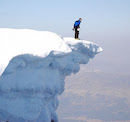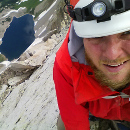weight loss and climbing pace
Forum rules
- This is a mountaineering forum, so please keep your posts on-topic. Posts do not all have to be related to the 14ers but should at least be mountaineering-related.
- Personal attacks and confrontational behavior will result in removal from the forum at the discretion of the administrators.
- Do not use this forum to advertise, sell photos or other products or promote a commercial website.
- Posts will be removed at the discretion of the site administrator or moderator(s), including: Troll posts, posts pushing political views or religious beliefs, and posts with the purpose of instigating conflict within the forum.
-
cougar

- Posts: 1196
- Joined: 8/9/2007
- 14ers: 58 2
- 13ers: 142 2
- Trip Reports (10)
Re: weight loss and climbing pace
I notice I move faster when I'm 5-10 lbs lighter, but also happen to be better acclimated and conditioned by that point, given winter weight gain and loss. So not sure it's totally due to the weight, but it must help some. My ideal weight is around 150 towards end of summer, but I get over 160 in winter/spring. Being in that range I definitely notice the extra 10-15 pounds more than a bigger person. I think the biggest benefit is doing bigger, higher days, and spending nights above 10k ft helps a lot too. Recently on multi-day trips I've felt stronger and faster the second day of ascents. I'm probably a bit lighter then too.
http://www.listsofjohn.com/m/cougar
"If we don't change direction, we'll end up where we're going."
"Bushwhacking is like a box of chocolates - you never know what you're gonna get."
"Don't give up on your dreams, stay asleep"
"If we don't change direction, we'll end up where we're going."
"Bushwhacking is like a box of chocolates - you never know what you're gonna get."
"Don't give up on your dreams, stay asleep"
-
Above_Treeline
- Posts: 437
- Joined: 8/19/2017
- 14ers: 3
- Trip Reports (1)
Re: weight loss and climbing pace
Are you 10-15 lbs overweight? If so, then losing weight should speed you up.LarryM wrote: ↑Sun Mar 31, 2019 12:07 pm Has there been any research regarding how much (all else being equal) a given amount of weight loss will increase climbing pace on a good (class 1) trail? I've seen research on general running speed versus weight loss (improvement of about 2 seconds / mile / pound), but I'd think that the benefit would be greater for going uphill. Just curious how much improvement I can expect from a 10 to 15 pound weight loss. Would love to, e.g., shave another 5 minutes off my trail head to summit time on Audubon.
But please don't use BMI. Seems about the same as saying you're a certain height and therefore should weigh a certain amount. Body types vary too much to make this useful.
I've been 15 lbs underweight, though (in the aftermath of a car wreck,) and I really don't recommend it. Idk that it's dangerous, but I'd rather have the muscle mass.
I support reintroducing grizzlies and wolves to their historic ranges.
-
zackrobinson2
- Posts: 124
- Joined: 9/24/2018
- Trip Reports (0)
Re: weight loss and climbing pace
The OP stipulated that everything else is remaining equal, and that includes fitness. Too many responses are dealing with how fitness would change with weight loss. That wasn’t the question. Ceteres Paribus, a 10% loss in weight will result in roughly a 10% improvement in time on a trail that is reasonably steep, which includes most 14er trails.
This assumes the person is above the ideal weight for hiking, of course. But nearly every uphill endurance athlete is quite skinny. If your BMI is above 21 or 22, you would probably be faster uphill if you weighed less, assuming you aren’t hauling a 75 pound pack. BMI is actually pretty useful when talking about extra weight here because additional muscle mass above the ideal size isn’t super useful in endurance events (again, assuming there no super heavy pack). There’s a reason uphill endurance athletes are universally skinny.
Tyler Hamilton, the former USPS cyclist during the end of the EPO era once said that he would rather weigh three pounds less than get an additional three points on his hematocrit. And that’s from a guy who was juicing to raise his hematocrit. Weight is massively important in uphill endurance sports. Even if you only have 6% bodyfat, but you are 6’, 185, you would be faster if you lost muscle mass and therefore weight. There’s no doubt about it.
This assumes the person is above the ideal weight for hiking, of course. But nearly every uphill endurance athlete is quite skinny. If your BMI is above 21 or 22, you would probably be faster uphill if you weighed less, assuming you aren’t hauling a 75 pound pack. BMI is actually pretty useful when talking about extra weight here because additional muscle mass above the ideal size isn’t super useful in endurance events (again, assuming there no super heavy pack). There’s a reason uphill endurance athletes are universally skinny.
Tyler Hamilton, the former USPS cyclist during the end of the EPO era once said that he would rather weigh three pounds less than get an additional three points on his hematocrit. And that’s from a guy who was juicing to raise his hematocrit. Weight is massively important in uphill endurance sports. Even if you only have 6% bodyfat, but you are 6’, 185, you would be faster if you lost muscle mass and therefore weight. There’s no doubt about it.
-
justiner

- Posts: 4690
- Joined: 8/28/2010
- 14ers: 3 1
- Trip Reports (37)
Re: weight loss and climbing pace
I'm not skinny.zackrobinson2 wrote: ↑Sun Apr 21, 2019 10:33 amThere’s a reason uphill endurance athletes are universally skinny.
Long May You Range! Purveyors of fine bespoke adventures
-
pbakwin
- Posts: 963
- Joined: 6/10/2006
- 14ers: 56
- 13ers: 64
- Trip Reports (19)
Re: weight loss and climbing pace
Do it sooner than later. At 57 I know age is no friend of PRs. I recall reading in The Lore of Running that a well-trained masters athlete can expect to lose 1% per year in terms of running pace. My own experience is that after 50 the decline is even more rapid than after 40. So, yes, you can lose weight, but you can’t get younger!LarryM wrote: ↑Mon Apr 01, 2019 8:43 am I do sometimes think that I'm overly obsessed with improving my vertical climb times, especially given (a) that I'm far from an elite athlete, (b) I'm 59 years old, (c) yet I am already, for my age, pretty strong uphill, especially in the high mountains. Now if I could just get my trail head to summit time on Elbert's standard route under 2 hours.
-
zackrobinson2
- Posts: 124
- Joined: 9/24/2018
- Trip Reports (0)
Re: weight loss and climbing pace
Perhaps I’m not familiar enough with your resume, but do you compete in timed uphill endurance events on a professional level?justiner wrote: ↑Sun Apr 21, 2019 11:25 amI'm not skinny.zackrobinson2 wrote: ↑Sun Apr 21, 2019 10:33 amThere’s a reason uphill endurance athletes are universally skinny.
I’m not talking about being the first to bike between 14ers or similar accomplishments. I’m talking about timed, competitive events. Look at pro cycling climbers or ultra runners who win big mountain races. They are all skinny. Rob Krar is tiny. Chris Froome weighs 52 pounds. Kilian has muscular legs but is still only 5’7”, 128, which is a BMI of 20. Jim Walmsley is probably even skinnier.
-
dpage

- Posts: 925
- Joined: 7/4/2009
- 14ers: 58 2
- 13ers: 28 3
- Trip Reports (1)
Re: weight loss and climbing pace
Chris Froome doesn't even weigh 52 kg. He's closer to 150 lbs.
http://listsofjohn.com/CompletionAll.php?M=dpage"
www.mountainproject.com/u/derick-page//110079707
"Resist much. Obey little." -Abbey
www.mountainproject.com/u/derick-page//110079707
"Resist much. Obey little." -Abbey
-
zackrobinson2
- Posts: 124
- Joined: 9/24/2018
- Trip Reports (0)
-
dpage

- Posts: 925
- Joined: 7/4/2009
- 14ers: 58 2
- 13ers: 28 3
- Trip Reports (1)
Re: weight loss and climbing pace
I assumed it was a typo.
http://listsofjohn.com/CompletionAll.php?M=dpage"
www.mountainproject.com/u/derick-page//110079707
"Resist much. Obey little." -Abbey
www.mountainproject.com/u/derick-page//110079707
"Resist much. Obey little." -Abbey
-
justiner

- Posts: 4690
- Joined: 8/28/2010
- 14ers: 3 1
- Trip Reports (37)
Re: weight loss and climbing pace
zackrobinson2 wrote: ↑Sun Apr 21, 2019 2:03 pmPerhaps I’m not familiar enough with your resume, but do you compete in timed uphill endurance events on a professional level?justiner wrote: ↑Sun Apr 21, 2019 11:25 amI'm not skinny.zackrobinson2 wrote: ↑Sun Apr 21, 2019 10:33 amThere’s a reason uphill endurance athletes are universally skinny.
I’m not talking about being the first to bike between 14ers or similar accomplishments.
You do not have the required permissions to view the files attached to this post.
Long May You Range! Purveyors of fine bespoke adventures
-
JaredJohnson

- Posts: 416
- Joined: 8/27/2014
- 14ers: 28 5
- 13ers: 13
- Trip Reports (3)
Re: weight loss and climbing pace
That seems like a sorta off-topic question for this thread, this forum, and mountaineering in general: when competing in timed uphill endurance events on a professional level, aren't the big winners and big losers separated by not that many minutes?zackrobinson2 wrote: ↑Sun Apr 21, 2019 2:03 pm...do you compete in timed uphill endurance events on a professional level?
Being lighter sure does help me, and dropping dead weight (spare tire fat) can only be good. But I suspect that for all but the most elite mountaineers in the world, the time difference resulting from "really fit and really skinny" vs. "really fit and kinda skinny" aren't meaningful. Non-professionals and professionals alike are interested in expanding the list of awesome routes and/or summits they can do, feeling good enough while doing it to make good decisions and have fun, etc. Shaving large amounts of time is useful for hitting weather / nightfall windows, but shaving a couple of minutes? Even if you're out for FKT's is that really going to matter compared to developing skills, experience, planning, and overall training?
-
justiner

- Posts: 4690
- Joined: 8/28/2010
- 14ers: 3 1
- Trip Reports (37)
Re: weight loss and climbing pace
Yeah, I'm with ya. I think shaving off a little weight to peak for a specific event is a fine thing, but isn't something I would say is sustainable for the long term (life tends to get in the way, anyways) and in extreme cases, could be dangerous (eating disorders, body dysmorphia, injuries that are in part exasperated by a diet that does not meet the caloric level needed for the workload put out). It's icing on the cake of a good training plan, but it shouldn't be the training plan.JaredJohnson wrote: ↑Sun Apr 21, 2019 11:11 pm
That seems like a sorta off-topic question for this thread, this forum, and mountaineering in general: when competing in timed uphill endurance events on a professional level, aren't the big winners and big losers separated by not that many minutes?
Being lighter sure does help me, and dropping dead weight (spare tire fat) can only be good. But I suspect that for all but the most elite mountaineers in the world, the time difference resulting from "really fit and really skinny" vs. "really fit and kinda skinny" aren't meaningful. Non-professionals and professionals alike are interested in expanding the list of awesome routes and/or summits they can do, feeling good enough while doing it to make good decisions and have fun, etc. Shaving large amounts of time is useful for hitting weather / nightfall windows, but shaving a couple of minutes? Even if you're out for FKT's is that really going to matter compared to developing skills, experience, planning, and overall training?
Long May You Range! Purveyors of fine bespoke adventures


